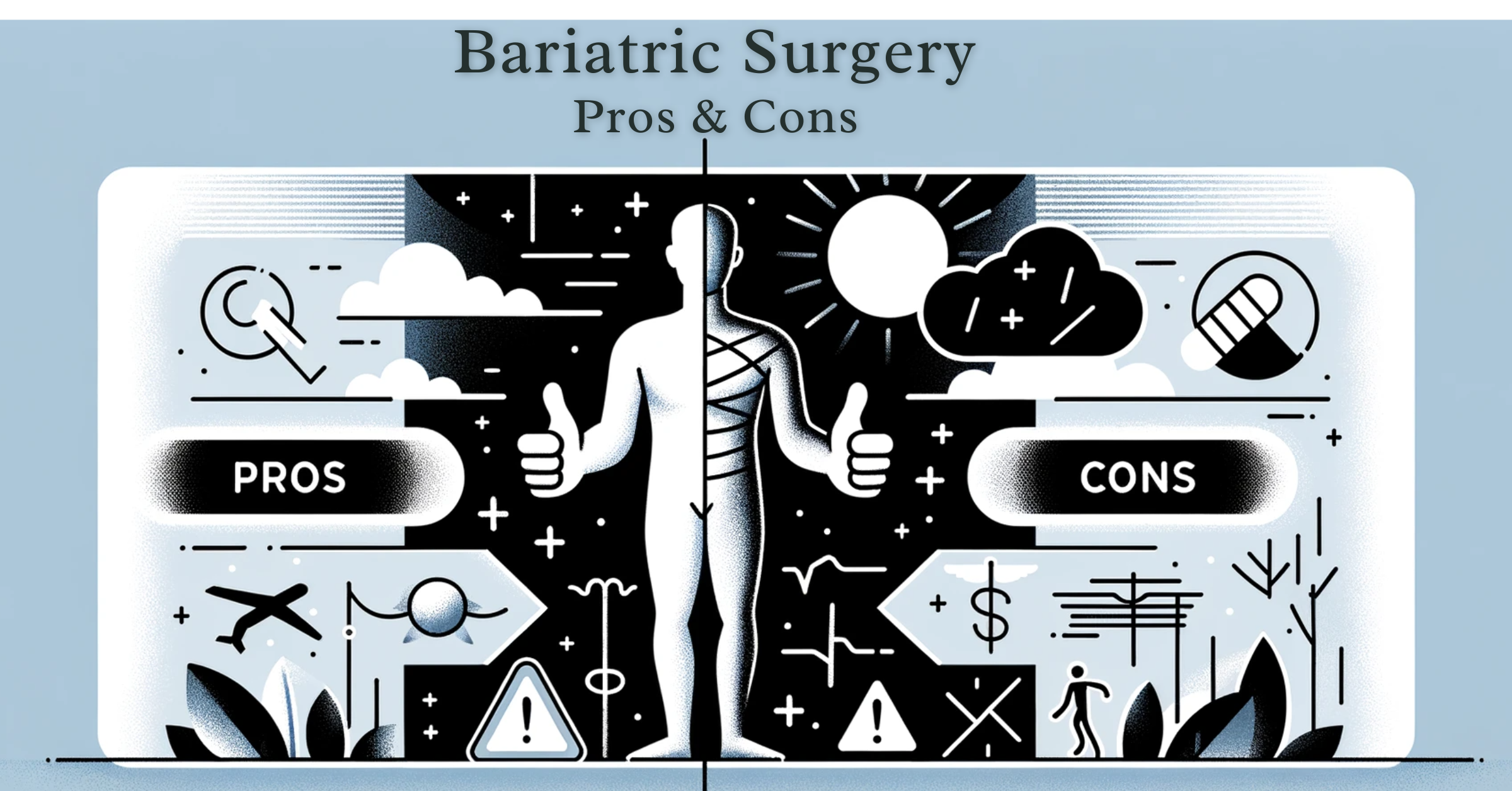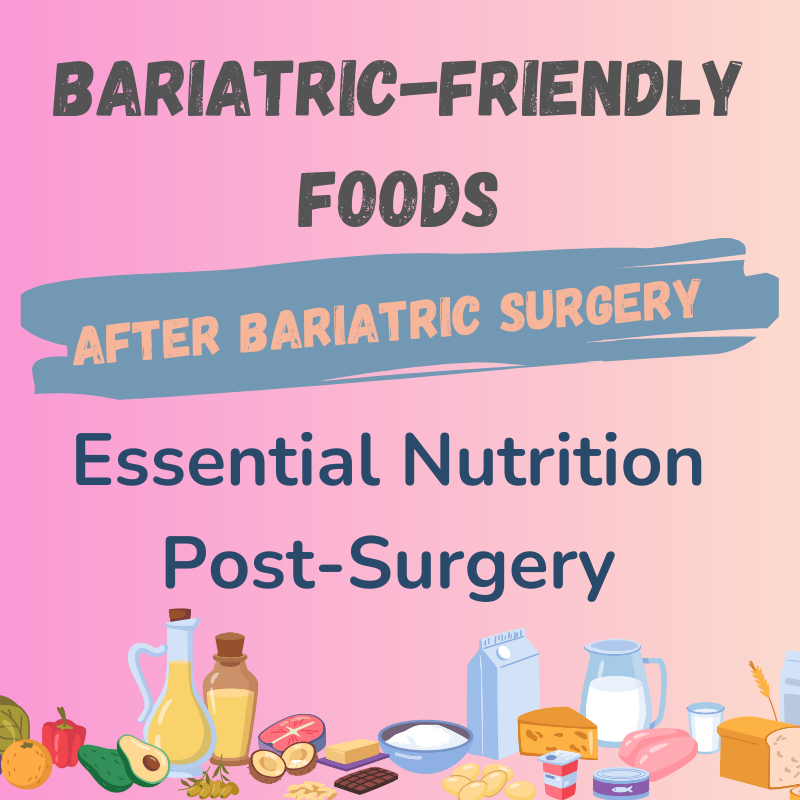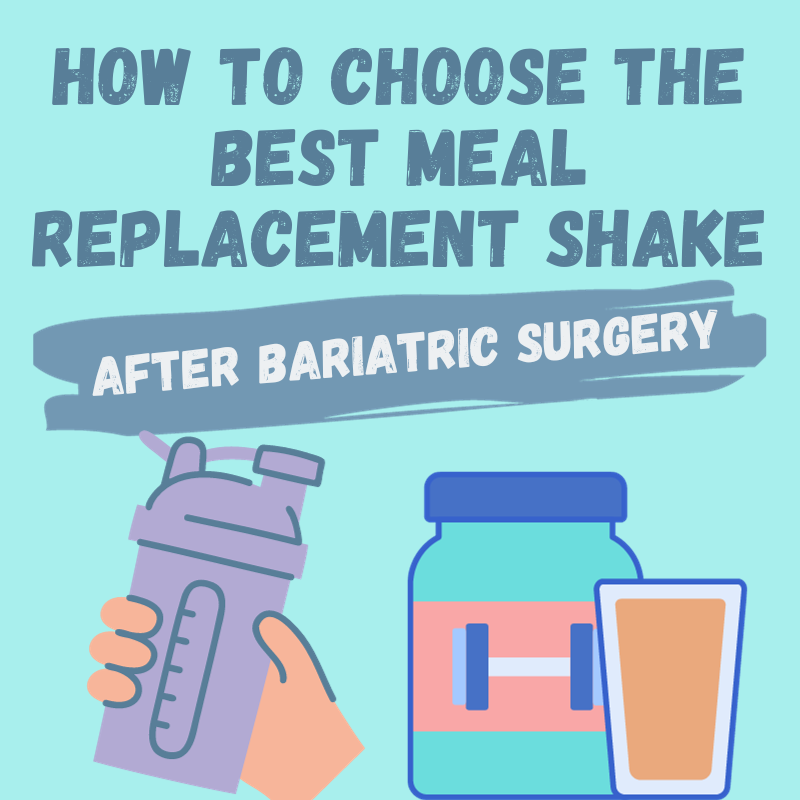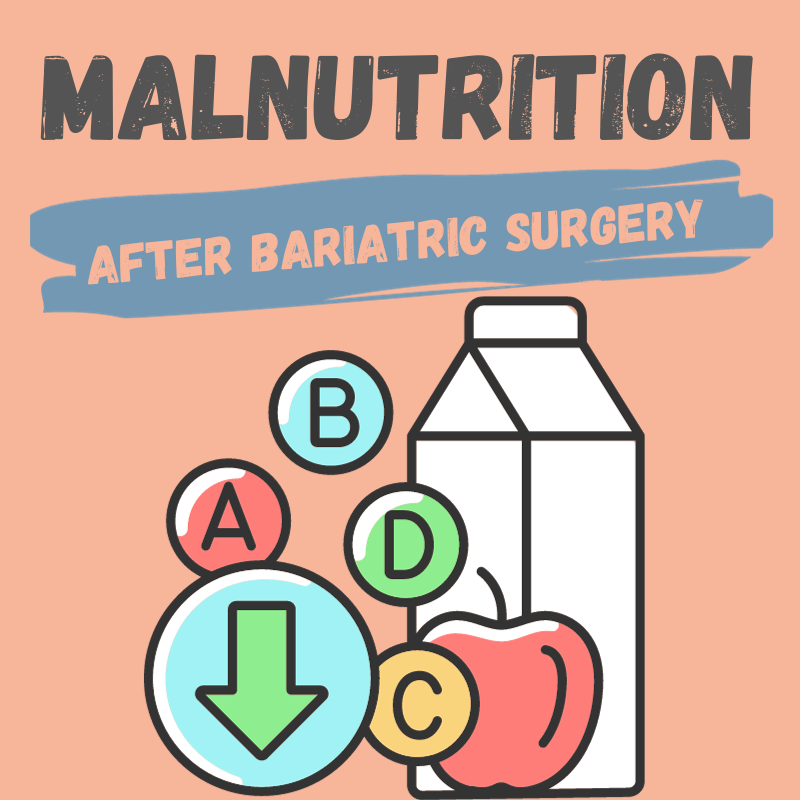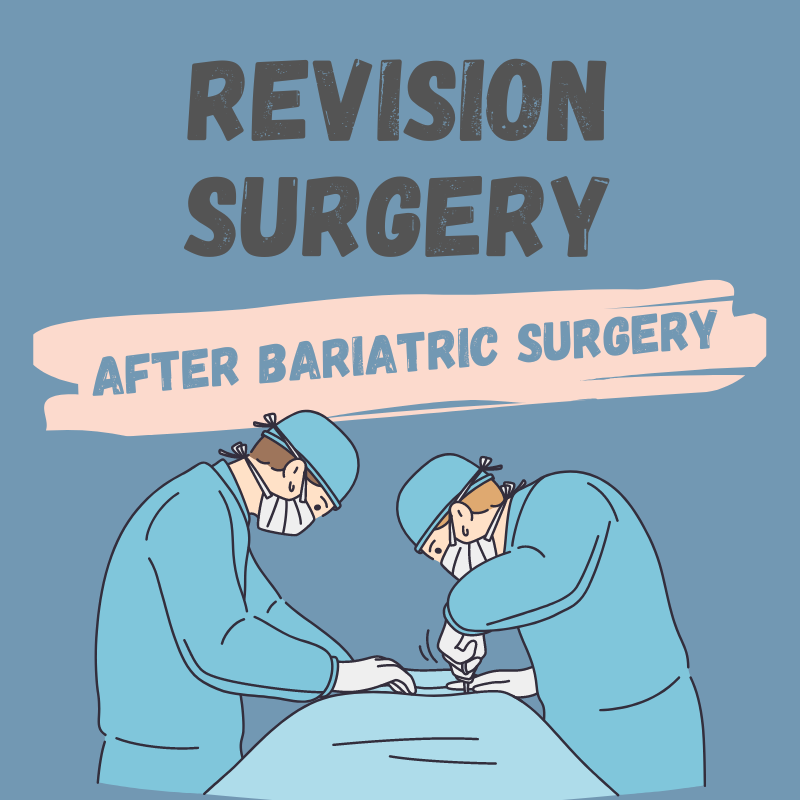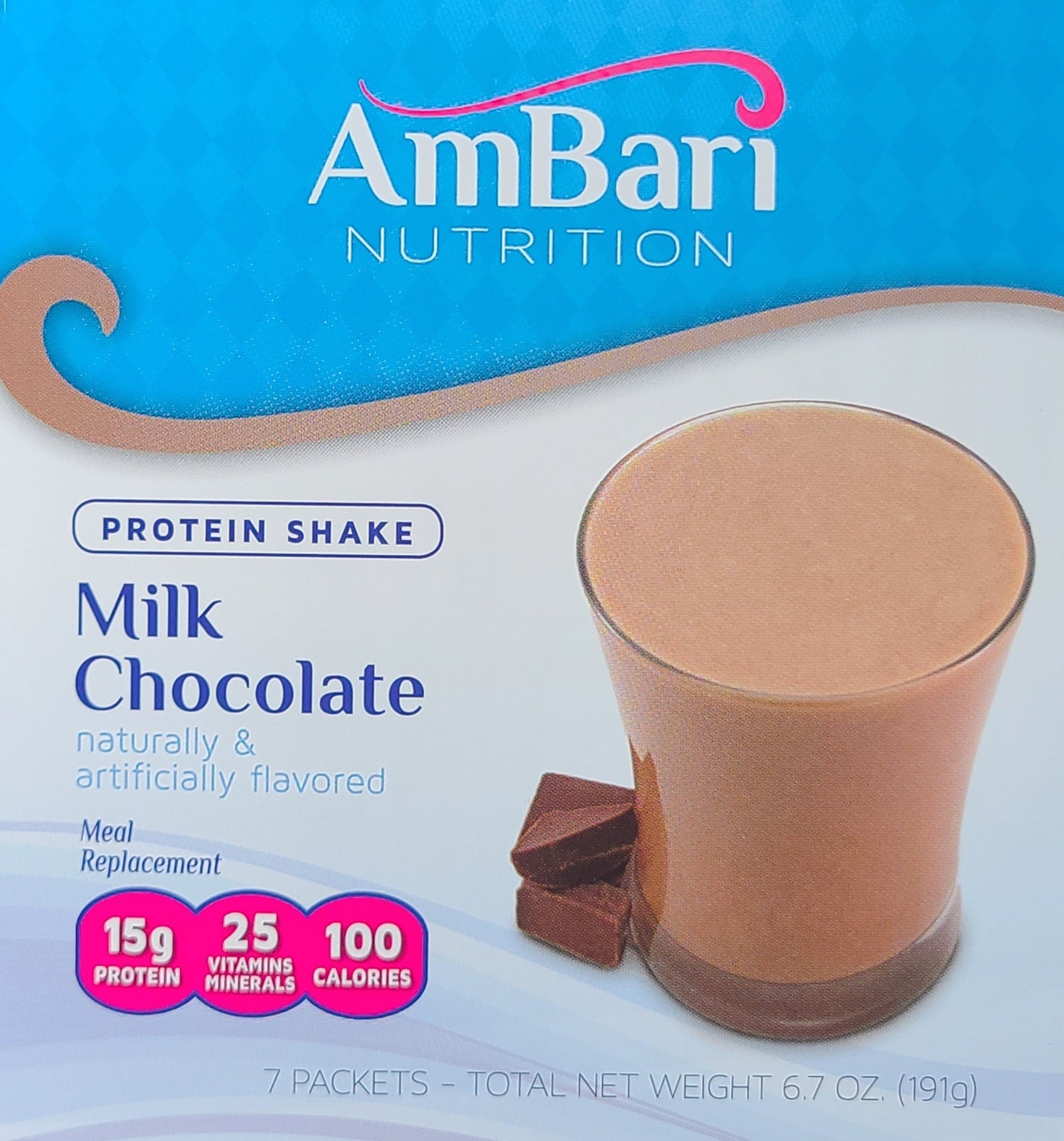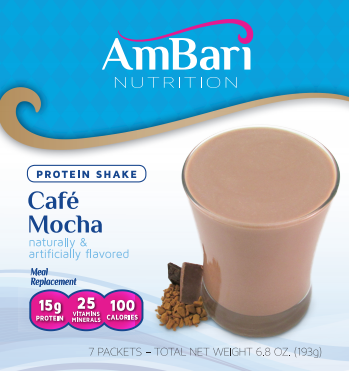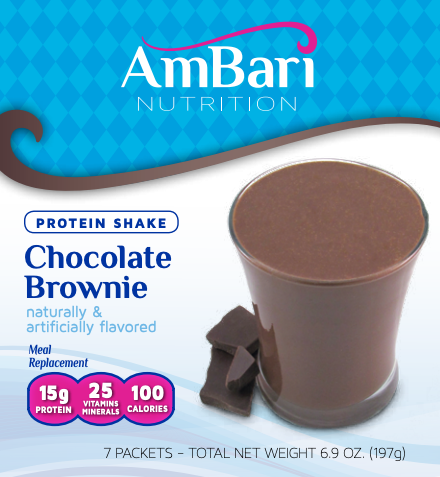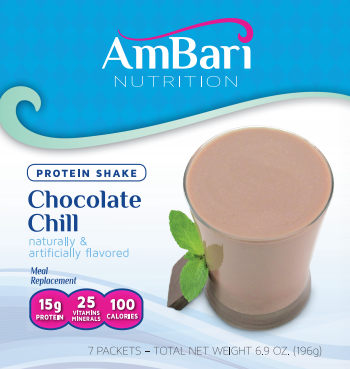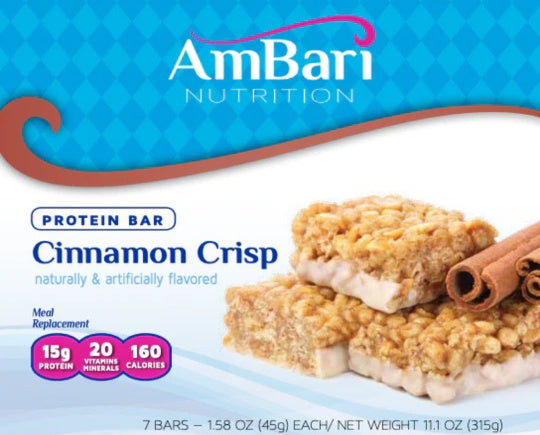Your cart is empty
Complete Guide To Nutrition After Bariatric Surgery

Proper nutrition following bariatric surgery will play a significant role in your new lifestyle. Here’s an overview of the fundamentals that you’ll need to understand going forward:
Table of Contents
- Understanding the Post-Surgery Diet Phases
- Essential Nutrients
- Staying Hydrated
- Portion Sizes
- Meal Planning
- Establishing Long-Term Healthy Eating Habits
- Overcoming Common Post-Surgery Challenges
Understanding the Post-Surgery Diet Phases
Each phase has its unique purpose, gradually introducing different types of foods into your diet. Let's explore these phases and their duration, so you know what to expect. If you'd like to dive deeper into these 4 diet phases that follow a bariatric surgery, click here.
Clear liquids: Lasting 1-2 days, this clear liquid phase is all about hydration. Sip on clear broth, sugar-free gelatin, and water to keep yourself hydrated and nourished.
Full liquids: In this phase, lasting about 1-2 weeks, you'll start introducing thicker liquids like protein shakes, strained soups, and yogurt into your diet.
Soft/pureed foods: For the next 2-4 weeks, you'll be munching on soft foods like scrambled eggs, cottage cheese, and mashed vegetables.
Solid foods: You've reached the final phase. After around 4-6 weeks, you'll gradually reintroduce solid foods into your diet, focusing on protein, fruits, and vegetables.
Remember, transitioning between phases should be a smooth ride, but make sure you listen to your body.
Essential Nutrients
Protein

Protein is a vital nutrient in your diet following bariatric surgery, as it plays a significant role in supporting muscle growth and maintenance while also promoting healthy weight loss. Following bariatric surgery, it is generally recommended for patients to aim for 60-80 grams of protein daily. However, individual protein requirements may vary depending on factors such as age, gender, activity level, and the specific type of bariatric surgery, depending on your doctor's recommendation.
Due to reduced food intake and changes in absorption after surgery, ensuring an adequate protein intake becomes even more important. Consuming sufficient protein aids in preserving lean body mass, preventing muscle loss, and accelerating the healing process. Protein also contributes to a sense of fullness and satisfaction, helping patients adhere to their post-surgery nutrition guidelines and achieve long-term weight loss
Vitamins & Minerals
Vitamins and minerals are crucial after bariatric surgery, as they play an essential role in maintaining overall health and preventing nutritional deficiencies. Due to the nature of the surgery and the subsequent changes in food intake and absorption, patients may be at an increased risk of experiencing deficiencies in key nutrients. Ensuring an adequate intake of vitamins and minerals helps to support the body's vital functions, such as immune system regulation, bone health, and energy production.
Due to altered food intake and changes in nutrient absorption, patients may require supplementation of vitamins and minerals to prevent deficiencies. Key micronutrients include vitamin B12, vitamin D, calcium, iron, and zinc.
Fiber
Fiber plays a crucial role in promoting digestive health and preventing constipation after bariatric surgery, when changes in diet and fluid intake can impact bowel function. Gradually increasing fiber intake through the consumption of whole grains, fruits, and vegetables can help maintain regular bowel movements and support a healthy gut microbiome. As your diet progresses through the different post-surgery phases, gradually add fiber-rich foods to avoid overwhelming your digestive system and to minimize potential discomfort.
Choose high-fiber snacks like nuts, seeds, and air-popped popcorn, and read food labels to be conscious of the fiber content in packaged foods. As you increase your fiber intake, it's essential to maintain adequate fluid intake to prevent constipation and promote healthy digestion.

Staying Hydrated
Staying hydrated following bariatric surgery is essential for several reasons. Ensuring proper hydration not only prevents dehydration and its associated symptoms but also supports long-term weight loss success and overall health.
Adequate hydration promotes optimal digestion, nutrient absorption, and overall gastrointestinal function. It also supports kidney function, helps flush toxins from the body, contributes to weight loss by promoting a sense of fullness, reducing appetite, and boosting metabolism. Additionally, staying well-hydrated helps maintain skin elasticity and aids in wound healing.
After bariatric surgery, patients need to pay special attention to their fluid intake, as their reduced stomach capacity and altered eating patterns may make it more challenging to consume enough liquids. To ensure you stay hydrated after surgery, follow these guidelines:
- Aim for at least 2 to 3 quarts (64 to 96 ounces) of non-carbonated water or other sugar-free liquids daily, taking small sips throughout the day.
- Drink sugar-free beverages (i.e., Crystal Light) or drinks with NO MORE than 5 calories per 8-ounce serving. Herbal tea is also a good option.
- Limit your caffeine intake to a maximum of 8 to 16 ounces per day.
- If you drink coffee or tea, ensure that what you add to it is sugar-free and fat-free.
- Stop drinking fluids 15 minutes before a meal.
- Do not drink fluids with your meal, as this quickly flushes food through your stomach.
- Resume drinking liquids 30 to 60 minutes after your meal.
Dehydration is one of the most common causes of rehospitalization after weight loss surgery. Keep an eye out for signs of dehydration, like dizziness, dark urine, or dry skin. If you notice any of these symptoms, make sure to reach for that water bottle. Proper hydration also means that your urine should be very light in color.
Portion Sizes
As for portion sizes, think "less is more." Managing portion sizes is so important following bariatric surgery, as it helps patients adapt to their reduced stomach capacity and prevents complications such as overeating, discomfort, and vomiting. Smaller, more frequent meals allow for better digestion and nutrient absorption while minimizing the risk of stretching the stomach pouch or causing gastrointestinal issues. Also, proper portion control contributes to achieving and maintaining weight loss goals, as it encourages mindful eating and helps patients develop long-lasting healthy eating habits. Use smaller plates, measure portions, and listen to your body's hunger cues.
Meal Planning
Meal planning is a fantastic strategy for bariatric patients in their post-surgery success, offering several benefits:
Nutrient-dense diet: Planning meals in advance allows patients to include a variety of lean proteins, whole grains, fruits, and vegetables, ensuring they receive essential nutrients while avoiding deficiencies.
Portion control: Preparing and portioning meals ahead of time helps patients adhere to appropriate portion sizes, preventing overeating and gastrointestinal discomfort associated with their reduced stomach capacity.
Improved decision making: With a meal plan in place, patients can avoid impulsive, unhealthy food choices that could hinder their weight loss progress or lead to nutritional imbalances.
Time and cost efficiency: Meal planning can save both time and money by reducing the number of trips to the grocery store and minimizing food waste. Bulk cooking and meal prepping can also free up time throughout the week.
Emotional support: Knowing what to eat and when to eat can alleviate some of the stress and anxiety associated with maintaining a post-surgery diet.
Consistency: Establishing a routine through meal planning can help bariatric patients create long-lasting, healthy eating habits.
Adaptability: As patients progress through the post-surgery diet phases and their nutritional needs change, meal planning can be adjusted accordingly to accommodate these transitions.
By investing time in meal planning, patients can save some money and ensure they’re eating a proper diet to ensure long-term success following bariatric surgery.
Establishing Long-Term Healthy Eating Habits
To fully benefit from your bariatric surgery, it's crucial to embrace a nutrient-dense but lower calorie diet. Focus on integrating bariatric-friendly foods such as lean proteins, a diverse array of fruits and vegetables, and whole grains into your everyday meals. Plan and prepare your meals ahead of time, so you're less likely to make unhealthy choices.
When dining out or attending social events, don't let the fear of food hold you back. Research the menu beforehand, choose healthier options, and don't be afraid to ask for modifications. Sharing meals with friends or asking for smaller portions can also help you enjoy the experience without compromising your nutrition goals.
Adopting mindful eating practices can also improve your post-surgery experience. By savoring each bite, chewing slowly, and genuinely appreciating the flavors and textures of your food, you'll not only improve your digestion process but also create a healthier relationship with food.
Overcoming Common Post-Surgery Challenges
Life after bariatric surgery can present a few challenges, but fear not! Here are some tips to overcome them:
Dumping syndrome
Dumping syndrome is a condition that occurs when food, particularly sugar or carbohydrates, moves too quickly from the stomach into the small intestine. Rapid gastric emptying causes the body to release a large amount of insulin in response to the sudden influx of sugar, leading to symptoms such as nausea, vomiting, abdominal pain, diarrhea, dizziness, weakness, rapid heart rate, and sweating.

To avoid dumping syndrome after bariatric surgery, consume smaller, more frequent meals, and focus on balanced meals with lean proteins, complex carbohydrates, and healthy fats. Limit high-sugar foods and refined carbohydrates, chew food thoroughly, and eat slowly to aid digestion. Avoid drinking liquids with meals, consuming them at least 30 minutes before or after instead. Some individuals may also benefit from lying down for 20-30 minutes after eating.
Constipation
Constipation after bariatric surgery is a common issue that patients may experience due to factors such as reduced food and fluid intake, changes in gut motility, and altered eating patterns. Inadequate fiber intake and physical inactivity can also contribute to constipation. To alleviate and prevent constipation, gradually increase fiber intake through the consumption of fruits, vegetables, and whole grains, as well as staying properly hydrated by drinking enough water throughout the day. Engaging in regular physical activity can also help promote healthy bowel movements.
Lactose intolerance
Lactose intolerance after bariatric surgery is a condition where patients develop difficulty digesting lactose, a sugar found in dairy products, due to changes in their gastrointestinal system or alterations in gut bacteria. This intolerance can result in symptoms such as gas, bloating, diarrhea, and abdominal pain upon consuming dairy products. To manage lactose intolerance after surgery, patients can choose lactose-free dairy alternatives or plant-based milk substitutes, and gradually reintroduce small amounts of lactose-containing foods to assess tolerance. Consider using over-the-counter lactase enzyme supplements to help with lactose digestion.
Difficulty Swallowing
Difficulty swallowing, also known as dysphagia, can occur in some patients following bariatric surgery due to changes in the gastrointestinal system, a reduced stomach size, and alterations in the digestive process. This issue may present as discomfort, pain, or a sensation of food getting stuck when trying to swallow. Several factors can contribute to this problem, including:
- Swelling or inflammation: Post-operative swelling or inflammation in the surgical area can temporarily cause difficulty swallowing.
- Eating too quickly: Consuming food too fast may make it challenging to swallow, as the smaller stomach pouch requires a slower pace.
- Insufficient chewing: Not chewing food thoroughly can lead to larger food particles, making swallowing more difficult and increasing the risk of discomfort or blockage.
- Food texture: Certain food textures, such as dry, tough, or fibrous foods, can be harder to swallow and digest after bariatric surgery.
- Anatomical changes: The surgery may cause changes in the esophagus or stomach, potentially impacting the swallowing process.
To address difficulty swallowing, patients should chew food thoroughly, eat slowly, maintain an upright posture during and after meals, and choose soft, moist foods.
Slider Foods
Slider foods are foods that easily pass through the stomach pouch after bariatric surgery without providing much satiety or nutritional value. These foods are typically high in simple carbohydrates and low in protein, fiber, and essential nutrients. Examples of slider foods include crackers, pretzels, popcorn, ice cream, and chips.
After bariatric surgery, it's important to avoid or limit the consumption of slider foods. Since they don't provide a feeling of fullness and tend to be high in calories, they can contribute to weight regain and hinder your weight loss progress. Instead, focus on consuming nutrient-dense, protein-rich, and fiber-rich foods that will help you feel satisfied and support your health goals.

Conclusion
We understand that adjusting to life after bariatric surgery will be challenging. The key to success after bariatric surgery lies in learning about the post-surgery diet phases and staying on track with your nutrition. Focus on the essential nutrients, hydration, portion control, and meal planning.
Remember, adopting long-term healthy eating habits is crucial, so steer clear of slider foods and embrace a nutrient-rich diet.
Take it one step at a time, and be patient with yourself. You're on the path to a healthier, happier you, and we're cheering you on every step of the way!
Key Takeaways
- Understand the post-surgery diet phases:
- Clear liquids (1-2 days): Focus on hydration with clear broth, sugar-free gelatin, and water.
- Full liquids (1-2 weeks): Introduce thicker liquids like protein shakes, strained soups, and yogurt.
- Soft/pureed foods (2-4 weeks): Enjoy soft foods like scrambled eggs, cottage cheese, and mashed vegetables.
- Solid foods (4-6 weeks): Gradually reintroduce solid foods, prioritizing protein, fruits, and vegetables.
- Essential nutrients:
- Protein: Aim for 60-80 grams daily, depending on individual factors and doctor's recommendations.
- Vitamins & Minerals: Ensure adequate intake to prevent deficiencies. Consider supplementation as needed.
- Fiber: Gradually increase fiber intake to promote digestive health and prevent constipation.
- Stay hydrated: Aim for 48-64 ounces of water daily to support digestion, kidney function, weight loss, and wound healing.
- Manage portion sizes: Smaller, more frequent meals help with digestion, nutrient absorption, and long-term weight loss.
- Plan your meals: Meal planning helps ensure a nutrient-dense diet, better portion control, and long-lasting healthy eating habits.
- Establish long-term healthy eating habits: Embrace a well-rounded diet, make mindful choices, and enjoy a healthier relationship with food.
- Overcome post-surgery challenges:
- Dumping syndrome: Focus on balanced meals, eat slowly, and avoid high-sugar foods.
- Constipation: Gradually increase fiber intake, stay hydrated, and engage in regular physical activity.
- Lactose intolerance: Opt for lactose-free or plant-based alternatives, and consider lactase enzyme supplements.
- Difficulty swallowing: Chew thoroughly, eat slowly, maintain an upright posture, and choose soft, moist foods.
- Slider foods: Avoid or limit consumption to prevent weight regain and support your health goals.
Continue Reading...
To learn more about life after a weight loss surgery, we highly recommend the "Complete Guide to Life after Weight Loss Surgery." This helpful guide talks about important things like what to eat, how to exercise, how to change your lifestyle, and how to stay on track emotionally.
Author: Allison Eisenberg Allison is a certified nutritionist and author with over 15 years of experience writing in the health and weight loss industry. She is passionate about helping people achieve their goals through proper nutrition and exercise. As a certified nutritionist, Allison has worked with clients from all walks of life and helped them make positive changes to their diet and lifestyle. |
Reviewed By: Dr. K. Huffman Kevin D. Huffman, D.O. is a board-certified bariatric physician who has dedicated his career to treating obesity. With over 10,000 patients under his care, he has become a respected authority in the field of bariatric medicine. Dr. Huffman has trained and mentored hundreds of healthcare providers and is widely recognized as a national leader in the field. |
Bariatric Guides & Information
More Info
Customer Favorites
- Choosing a selection results in a full page refresh.







